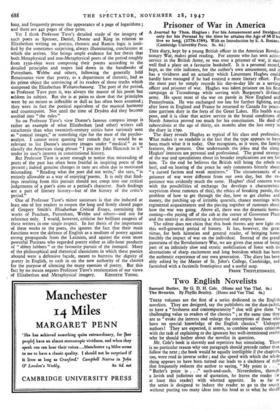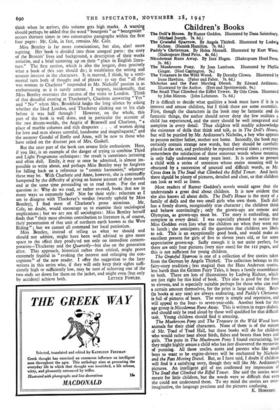Two English Novelists
THESE volumes are the first of a series dedicated to the English novelists. They are designed, say the publishers on the dust-jacket, to have a "freshness and contemporaneity" that will give them "a challenging value to readers of the classics " ; at the same time they are to " evoke the interest and enlarge the conceptions of those who have no special knowledge of the English classics." Unhappy authors! They are expected, it seems, to combine serious criticism with the task of explaining to the ignorant but well-intentioned reader why he should bother about the novelist in question.
Mr. Cole's book is slovenly and repetitive but stimulating. There is no particular reason why one paragraph should precede rather than follow the next ; the book would be equally intelligible if the chapters, too, were read in inverse order ; and the speed with which the whole thing appears to have been turned out leads to a slackness of style that frequently reduces the author to saying, " My point is . . ." " Butler's point is . ." such-and-such. Nevertheless, through a lavish and judicious use of quotation, he leaves the reader Of at least this reader) with whetted appetite. In as far as the series is designed to induce the reader to go to the source without putting too many ideas into his head as to what he should think when he arrive3, this volume gets high marks. A warning should perhaps be added that the word " bourgeois " or " bourgeoisie " occurs thirteen times in two consecutive paragraphs within the first four pages : Mr. Cole, in fact, remains Mr. Cole.
Miss Bentley is far more conscientious, but also, alas! more aspiring. Her book is divided into three unequal parts: the story of the Brontes' lives and background, a description of their works seriatim, and a brief summing up on their " place in English litera- ture." The first section, which is also the longest, does precisely what a book of this sort should do ; it establishes the setting and arouses interest in the characters. It is marred, I think, by a senti- mental turn both of thought and of phrase: to say that "all that was woman in Charlotte " responded to Mr. Nicholls' passion is as embarrassing as it is surely untrue. I suspect, incidentally, that Miss Bentley overrates the success of the visits to London. Think of that dreadful evening at Thackeray's, Charlotte answering " Yes " and " No " when Mrs. Brookfield broke the long silence by asking whether she liked London, and Thackeray slinking out to his club
before it was half through ! However, on the whole, this part of the book is well done, and in particular the account of the two dream-worlds, the Angria of Branwell and Charlotte, " a place of marble columns and rich draperies . . . of women dying for love and men always scornful, handsome and magniloquent," and the austerer Gondal of Emily and Anne, will be new to those who have relied on the discreet pen of Mrs. Gaskell.
But the later part of the book can arouse little enthusiasm. Here, if you like, is an example of the danger of trying to combine Third and Light Programme techniques: the result is sometimes irritating and often dull. Emily, it may at once be admitted, is almost im- possible to write about, and perhaps Miss Bentley may be forgiven for falling back on a reference to "cosmic harmonies," whatever these may be. With Charlotte and Anne, however, she is continually hampered by the difficulty of giving an honest account of their novels and at the same time persuading us to read them. For the real question is : Why do we read, or rather re-read, books that are in many ways so extremely bad? Not for their style: reluctant as I am to disagree with Thackeray's verdict (warmly upheld by Miss Bentley), I find most of Charlotte's prose atrocious. Mr. Cole, no doubt, would encourage us to examine their sociological implications ; but we are not all sociologists: Miss Bentley herself finds that " their most obvious contribution to literature is, of course, their presentation of that unit of northern earth known as the West Riding " ; but we cannot all command her local patriotism. Miss Bentley, instead of telling us what we should and should not admire, might have been well advised to give more space to the effect they produ.-ed not only on immediate contem- poraries—Thackeray and the Quarterly—but also on the generation after. This approach, historical rather than critical, might prove extremely fruitful in " evoking the interest and enlarging the con- ceptions " of the new reader. I offer the suggestion to the later writers in this series who, if they will only keep their sights suffi- ciently high or sufficiently low, may be sure of achieving one of the two ends set down for them on the jacket, and might even (but only





























 Previous page
Previous page